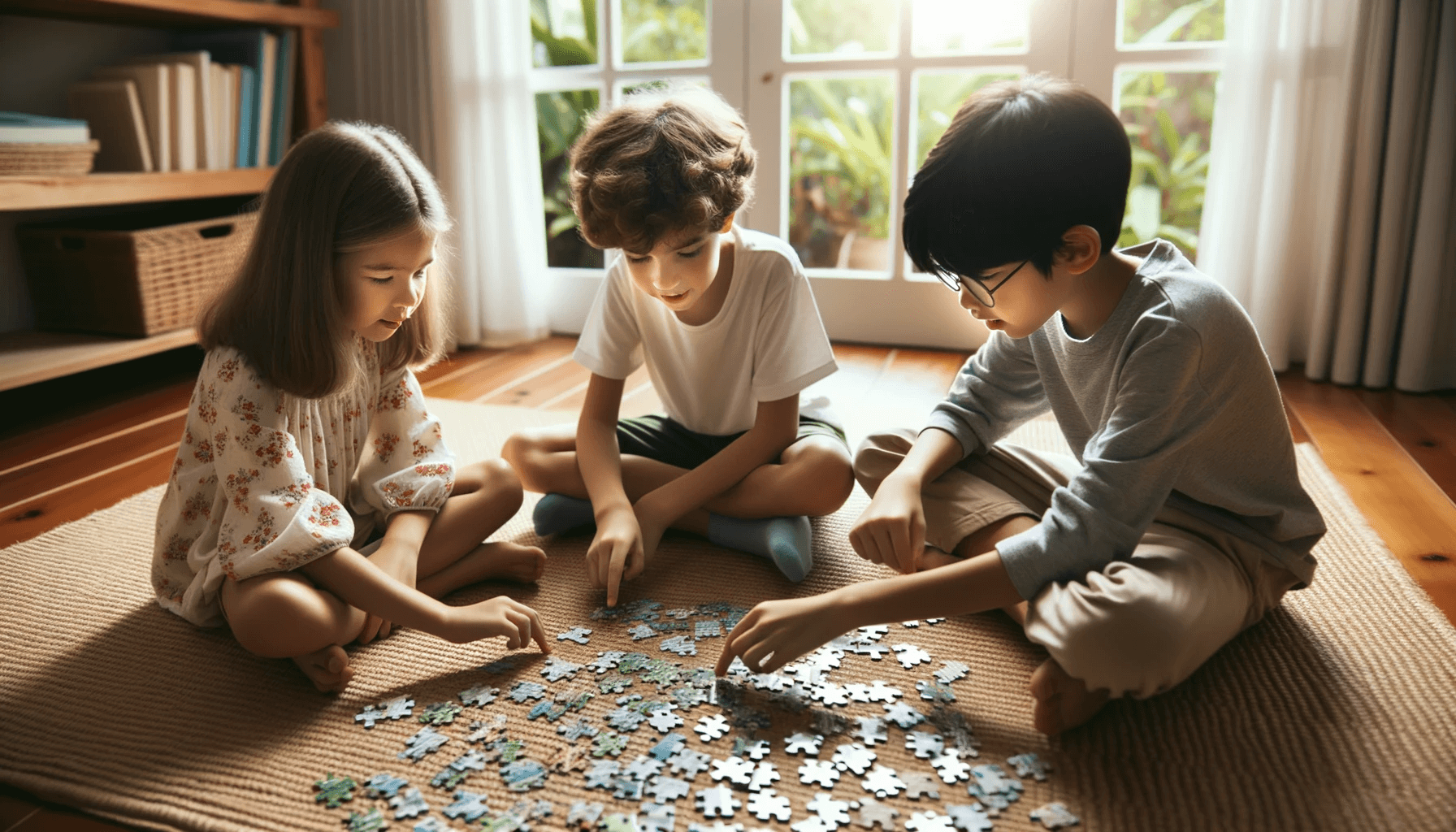26th Oct 2023
Delightful Learning Fun: Exploring Jigsaw Puzzles for Kids
The World of Jigsaw Puzzles
Welcome to the captivating world of jigsaw puzzles, where fun meets learning and creativity.
What are Jigsaw Puzzles?
Jigsaw puzzles are a type of puzzle that requires the assembly of oddly shaped and interlocking pieces. Each piece usually has a small part of a picture on it; when complete, a jigsaw puzzle produces a complete picture.
Jigsaw puzzles come in various forms and complexities, ranging from those with a minimal number of large pieces for younger children, to those with thousands of small pieces intended for adults or older children. They can portray a wide array of images, from beautiful landscapes and animals to famous artworks and educational themes.
The Importance of Puzzles for Kids
As a parent, you might be wondering why you should consider jigsaw puzzles for kids as part of your child's toy collection. The answer lies in the numerous cognitive, social, and emotional benefits they offer.
Puzzles are a fantastic tool for enhancing your child's problem-solving and critical thinking skills. They challenge your child's mind and require them to think logically and strategically. This helps them develop important cognitive skills that will be beneficial not only in their academic journey but also in their everyday life.
Additionally, puzzles are a great way to promote patience and concentration, as children must work carefully to find the correct piece and fit it in the right place. They help to improve hand-eye coordination and fine motor skills.
Moreover, completing a jigsaw puzzle gives a sense of achievement and boosts a child's self-confidence. It's a task that requires patience, effort, and persistence, so when your child finally places the last piece, they experience a very satisfying victory.
For a more detailed exploration of the importance of puzzles, check out our article on puzzles for kids.
The beauty of jigsaw puzzles for kids lies in their simplicity and the vast array of skills they help develop. They are more than just a toy; they are a powerful educational tool that can provide countless hours of entertainment and learning. Whether your child is a novice puzzler or a seasoned pro, there's a jigsaw puzzle out there that's just right for them.
Cognitive Benefits of Jigsaw Puzzles
Jigsaw puzzles aren't just a source of entertainment; they can also be powerful cognitive tools. As a parent, introducing jigsaw puzzles for kids can help enrich your child's mental abilities in multiple ways. Let's explore some cognitive benefits that jigsaw puzzles bring to the table.
Promoting Problem-Solving Skills
One of the primary benefits of puzzles is the promotion of problem-solving skills. When your child works on a jigsaw puzzle, they are essentially engaging with a problem that requires a solution. They must figure out where each piece fits within the larger picture. This encourages analytical thinking, logical reasoning, and strategic planning, all of which are crucial problem-solving skills.
Moreover, jigsaw puzzles offer a hands-on experience in dealing with challenges and overcoming obstacles, providing a safe and fun platform for kids to develop resilience in the face of difficulties.
Enhancing Memory and Concentration
Jigsaw puzzles can significantly enhance memory and concentration. As your child works on a puzzle, they will need to remember shapes, colours, patterns, and the spatial arrangement of various pieces. This process helps to improve short-term memory and sharpen focus.
In addition, the act of piecing together a jigsaw puzzle requires a great deal of concentration. This practice can help increase your child's attention span, which is particularly beneficial in today's fast-paced, distraction-prone world.
Encouraging Visual-Spatial Reasoning
Visual-spatial reasoning is another cognitive skill that can be improved through jigsaw puzzles. It is the ability to understand and manipulate visual information, which is a crucial skill for reading maps, understanding diagrams, and later in life, for fields like architecture, engineering, and graphic design.
While working on jigsaw puzzles, children must rotate, flip, and shift pieces in their minds to determine the correct fit. This mental manipulation of visual information helps to enhance their visual-spatial reasoning abilities.
In conclusion, jigsaw puzzles for kids offer a wealth of cognitive benefits. They promote problem-solving skills, enhance memory and concentration, and encourage visual-spatial reasoning. So next time you are considering a gift or a new activity for your child, remember the cognitive potential that lies within a simple jigsaw puzzle. For more fun and challenging activities, check out our articles on brain teasers for kids and logic puzzles for kids.
Social Benefits of Jigsaw Puzzles
Not just a source of fun, jigsaw puzzles for kids also offer numerous social benefits. These engaging toys can help cultivate vital social skills, including teamwork and cooperation, communication, and patience and persistence.
Fostering Teamwork and Cooperation
When your child works on a jigsaw puzzle with friends or family members, they're learning the value of teamwork and cooperation. Each participant brings their unique perspective to the table, providing a diverse range of solutions to fit the puzz le pieces together. This collaborative effort fosters a sense of community and teaches kids the importance of working together to achieve a common goal. To explore more cooperative play activities, check out our article on puzzle games for kids.
le pieces together. This collaborative effort fosters a sense of community and teaches kids the importance of working together to achieve a common goal. To explore more cooperative play activities, check out our article on puzzle games for kids.
Building Communication Skills
Jigsaw puzzles also offer a wonderful opportunity to build communication skills. As your child interacts with others to assemble the puzzle, they'll naturally start discussing strategies, sharing ideas, and asking questions. This dialogue not only enhances their verbal communication skills but also promotes active listening and understanding. For more challenging tasks that can boost your child's communication skills, consider introducing them to brain teasers for kids.
Instilling Patience and Persistence
Completing a jigsaw puzzle isn't always easy. It requires patience and persistence, especially when dealing with more complex puzzles. As your child works through the challenge, they learn to stay focused, patient, and persistent. They also learn that it's okay to make mistakes and that the most important thing is to keep trying until they succeed. These are valuable life lessons that will help them navigate various situations in the future. For more activities that can foster these qualities, read our piece on logic puzzles for kids.
In a nutshell, jigsaw puzzles are an excellent tool for developing your child's social skills. As they engage in this fun activity, they're also learning, growing, and preparing for the future. Whether it's a simple puzzle for a young child or a more complex one for an older kid, the social benefits are undeniable. For more variety and options, you might also want to look at wooden puzzles for kids, which can provide a new level of tactile engagement for your child.
Emotional Benefits of Jigsaw Puzzles
Apart from cognitive and social benefits, jigsaw puzzles for kids also offer significant emotional benefits. Two of the most notable of these are boosting confidence and self-esteem and providing relaxation and stress relief.
Boosting Confidence and Self-Esteem
When your child successfully completes a jigsaw puzzle, it instills a sense of accomplishment and pride in them. Each piece they fit correctly is a small victory that boosts their confidence. As they tackle more complex puzzles, their self-esteem grows, knowing they have the ability to solve challenging tasks on their own.
The process of completing a puzzle encourages children to set goals and persevere until they achieve them. This determination and ability to focus on a task can translate into other areas of their life as well, such as academics and building social relationships.
For more on how puzzles can aid in developing a child's abilities, check out our article on puzzles for kids.
Providing Relaxation and Stress Relief
Engaging in jigsaw puzzles can also serve as a form of relaxation for children. The act of figuring out where each piece goes helps them to focus and quiet their minds, providing a break from the constant stimulation of today's fast-paced, digital world.
In fact, puzzles can play a part in reducing anxiety. As children work on puzzles, their minds shift into a meditative state, which can help lower stress levels. The concentration required to complete a puzzle distracts from worrying thoughts, allowing them to relax and unwind.
Moreover, the satisfaction of seeing the final, completed image can bring a sense of peace and contentment. This feeling of relaxation and stress relief can be especially beneficial before bedtime, helping them wind down for a restful night's sleep.
To explore more relaxing activities for children, you might want to read our article on puzzle games for kids.
In conclusion, jigsaw puzzles offer much more than just entertainment for children. They can boost confidence, provide a sense of accomplishment, and offer a relaxing activity that can help reduce stress levels. So, when you next consider a gift for your child, remember the multifaceted benefits a simple jigsaw puzzle can provide.
Choosing the Right Jigsaw Puzzle
Selecting the perfect jigsaw puzzle for your child involves several considerations. You need to account for their age, interests, and skill level to ensure the puzzle is both challenging and enjoyable. Let's break down these factors to help you choose the best jigsaw puzzles for kids.
Age-Appropriate Puzzles
Firstly, it's crucial to pick a puzzle that aligns with your child's age and developmental stage. Young children, for example, will be more suited to puzzles with larger pieces and simpler images. As they age and their cognitive abilities develop, they can progress to puzzles with more pieces and complex designs.
Here's a general guide to help you choose age-appropriate puzzles:
| Age Range | Puzzle Piece Count |
|---|---|
| 2-3 years | 4-12 pieces |
| 4-5 years | 12-60 pieces |
| 6-7 years | 60-100 pieces |
| 8+ years | 100-500 pieces |
Remember, these are just guidelines. Every child is unique, and their ability to solve puzzles can vary. Experiment with different puzzle games for kids to understand their comfort level.
Theme and Design Considerations
The theme and design of the puzzle can significantly influence your child's interest in the activity. Choose puzzles with colourful and engaging images that reflect your child's interests. It could be anything from animals and superheroes to landscapes and outer space themes. Remember, the more they like the image, the more motivated they'll be to complete the puzzle.
Puzzle Size and Complexity
Another factor to consider is the size and complexity of the puzzle. This doesn't just refer to the number of pieces, but also the intricacy of the image and the shape of the pieces. More complex puzzles often have irregularly shaped pieces or intricate images that can be challenging to assemble.
For younger children, start with puzzles that have simple shapes and clear, distinct images. As they grow older and more adept at solving puzzles, you can introduce them to more complex jigsaw puzzles to provide a greater challenge.
Choosing the right puzzle can be a great way to foster your child's cognitive, social, and emotional development. Whether you're looking for wooden puzzles for kids or more challenging logic puzzles, taking these considerations into account can help you find the perfect fit for your child's needs.

